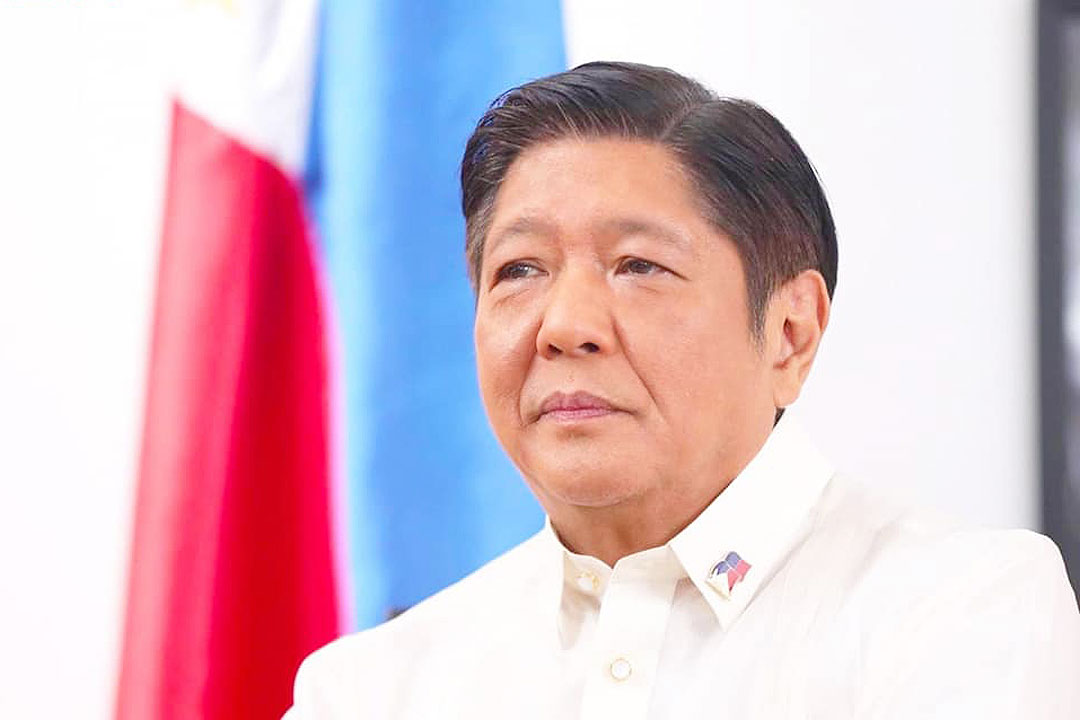Marcos hits back at Duterte after drug tirade

By Kyle Aristophere T. Atienza and Beatriz Marie D. Cruz Reporters
PHILIPPINE President Ferdinand R. Marcos, Jr. struck back on Monday at his predecessor Rodrigo R. Duterte, who called him a “drug addict,” saying the firebrand leader’s fentanyl use could have affected his judgment.
“I think it’s the fentanyl,” Mr. Marcos told reporters shortly before leaving for Vietnam in response to claims made by Mr. Duterte on Sunday while speaking at a rally in his hometown Davao against moves to amend the country’s Constitution.
When asked about the drug use accusations and the call for him to step down, Mr. Marcos said the former president “has been taking the drug for a very long time now… After five, six years, it has to affect him.”
In 2016, Mr. Duterte admitted he used to take the highly addictive synthetic opioid fentanyl for pain relief after a motorcyle accident. “I hope his doctors take better care of him,” Mr. Marcos said.
Mr. Duterte also said Mr. Marcos was on the drug agency’s so called “narco-list” that was submitted to him when he was still mayor of Davao city, a charge that the Philippine Drug Enforcement Agency vehemently denied.
House Speaker and presidential cousin Martin G. Romualdez urged Mr. Duterte to show proof about his drug allegations.
“The current discourse between the two warring factions is definitely not helping the community of people who use drugs who have historically been bearing the brunt of public stigma,” medical doctor RJ Naguit, who heads the Youth for Mental Health Coalition, Inc., said in a Viber message.
“Their statements, which seem to use drug use as political bullets, further divert the public discourse away from conversations that center on public health interventions and other ways to support people whose lives involve drugs,” he added.
“Pharmaceutical fentanyl is a synthetic opioid approved for treating severe pain, typically advanced cancer pain,” according to the US Centers for Disease Control and Prevention.
Anthony Borja, who teaches political science at De La Salle University, said the exchange between Mr. Marcos and the Duterte father-and-son tandem “can be construed not only as intense yet petty, but also as something situated between contradictory tendencies of family and professionalism in politics.”
“This is considering how Imee Marcos and Sara Duterte are trying to stay away from the fray by focusing on policy issues,” he said via Messenger chat.
Their supporters can either condemn them for not taking a clear stand in defense of their family members, or appreciate their efforts to stay above the mudslinging, he said.
‘CLIENTELIST ALLIANCE’
Meanwhile, the House of Representatives affirmed its “strong and unqualified support” for President Ferdinand R. Marcos, Jr. through a resolution after Mr. Duterte’s tirade.
During a political rally in Davao City on Sunday, city Mayor Sebastian Z. Duterte, son of the ex-President, urged Mr. Marcos to step down.
Deputy Speaker and Quezon Rep. David C. Suarez called the younger Mr. Duterte’s remarks “totally disrespectful of the man given the position that he holds.”
During the Davao rally, Mr. Duterte accused Mr. Romualdez and First Lady Liza Araneta-Marcos of being behind the push to amend the 1987 Constitution through a people’s initiative.
The anti-Charter change rally, which was also attended by presidential sister Senator Maria Imelda “Imee” Marcos, happened on the same day the government held a rally in Manila to launch its brand of governance called “Bagong Pilipinas” (New Philippines), which was attended by Vice President Sara Duterte-Carpio. She also attended the Davao rally later.
The quarrel between Mr. Marcos and the Dutertes were all “on their families” and not about the issues facing ordinary Filipinos, Jean Encinas-Franco, who teaches political science at the University of the Philippines, said in a Facebook Messenger chat.
“These are all consistent with how clientelist the alliance is — it favors each other, zero policy honesty and invokes tribalist/traditional Filipino values,” Hansley A. Juliano, a political science lecturer at the Ateneo de Manila University, said via Messenger chat.
In a statement, the Speaker said he’s stumped by the seemingly conflicted stance of Mr. Duterte in moves to amend the Charter, noting that the tough-talking leader had based his entire presidential campaign on a shift to a parliamentary form of government.
The Commission on Elections (Comelec) on Monday suspended all proceedings related to a people’s initiative for constitutional changes.
House leaders declared their support for Resolution of Both Houses 6 filed in the Senate, which proposes amendments to the Charter’s economic provisions.
The Senate resolution was authored by Senate President Juan Miguel F. Zubiri and Senators Loren Legarda and Juan Edgardo Angara.
The House’s collaboration with the Senate is a “shared commitment to nurturing an economic landscape that is dynamic, inclusive and forward-thinking, ensuring that prosperity reaches every corner of our nation,” the political party leaders in the House said in their joint manifesto.
Last week, the 24-member Senate issued a statement against the people’s initiative, saying it is “ridiculous” for the Senate to have a “dispensable and diluted role” in the “Cha-cha” push.
Also on Monday, Mr. Zubiri said the President is set to ask the House to repeal its push to amend the Constitution through a people’s initiative.
“The President is set to appeal to the House of Representatives and the other initiators of the people’s initiative to stop this,” he told the plenary.
Presidential Communications Office chief Cheloy Velicaria-Garafil did not immediately reply to a Viber message seeking comment.
“The President expressed the need to protect the bicameral nature of Congress, which upholds the system of checks and balances within the legislative branch,” he said a privilege speech. — with Reuters



